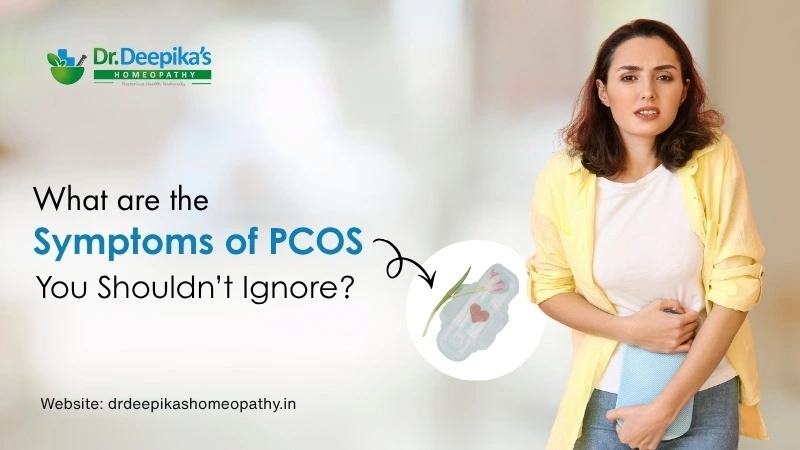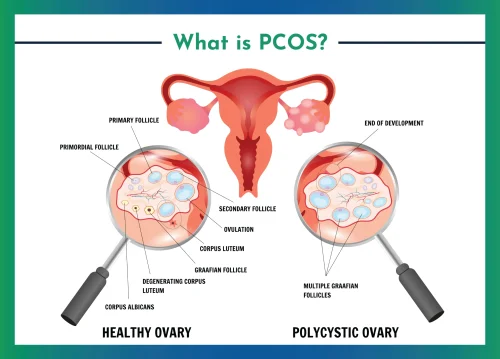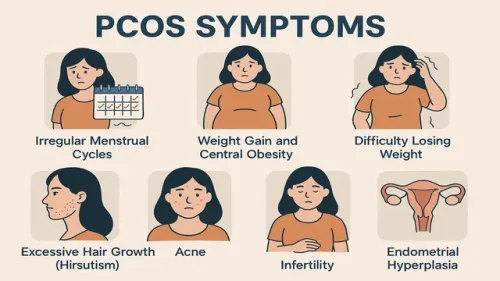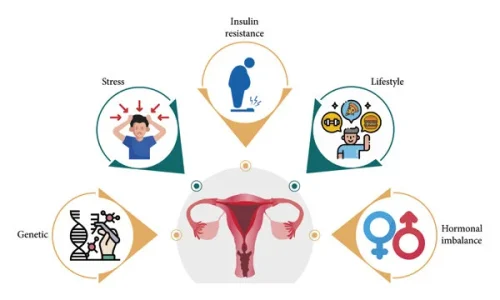
What are the Symptoms of PCOS You Shouldn’t Ignore?
Polycystic Ovary Syndrome (PCOS) is a complication in women of reproductive age related to hormones. Symptoms may be subtle in the beginning, but if dismissed, they may lead to life-altering health conditions. Some of the most common signs of PCOS are ovarian dysfunction, rapid weight gain, acne, hirsutism, thinning hair, and infertility. Identifying symptoms early can help with early diagnosis and treatment, allowing women to stabilize their hormones, reproductive health, and overall well-being.
What is PCOS?
Polycystic Ovary Syndrome (PCOS) is a prevalent hormonal condition that primarily impacts women of childbearing age. In women with PCOS, the ovaries produce high levels of male hormones, or androgens, which can lead to irregularities in menstrual patterns, ovarian cysts, and problems with getting pregnant. In addition, women with PCOS often experience symptoms such as acne, weight gain, and hair loss or excess hair growth.

Symptoms of PCOS
Polycystic Ovary Syndrome (PCOS) can have multiple effects on women that can be mild to severe in nature. It is very important to recognize these feelings early for a thorough diagnosis and proper management. The following signs are common:
- Irregular Menstrual Cycle – Periods may be less than 21 days apart, delayed, or very heavy. An early phenomenon of skipped months, prolonged bleeding, or unpredictable cycles is an early indication of hormonal imbalance and is often affected by fertility.
- Excess Hair Growth – Higher levels of male hormones can lead to unwanted hair on the face, chest, back, or abdomen. This can undermine your self-confidence and could require the attention of a specialist.
- Acne and Oily Skin – Persistent or severe acne, oily skin, and clogged pores can often appear associated with hormonal imbalance. These skin issues may not be resolved using regular skincare regimes.
- Weight Gain – Sudden or unexpected weight gain, especially around the abdomen and waist, is commonplace in PCOS. Insulin resistance, often associated with women with PCOS, can contribute to weight management in women with PCOS.
- Thinning Hair or Hair Loss – Hair on the scalp may be thinning or lost following a male-pattern loss. This is progressive and has been associated with having excess androgen levels.
- Dark Skin Patches – Dark mucosal patches may appear on the neck, armpits, or groin areas. These patches can signal insulin resistance.
- Fertility Issues – Irregular or absent ovulation can create challenges in becoming pregnant. PCOS is one of the leading causes of infertility in women, but early intervention will create better opportunities for reproductive health.
- Mood Changes and Fatigue – Hormonal fluctuations can result in overall fatigue, low energy, anxiety, irritability, or depression. Sometimes women also complain of brain fog or an inability to concentrate.
- Sleep Disturbance – You may have poor sleep habits, problems staying asleep, or sleep apnea, and all of these issues can link back to hormonal disturbances, weight gain, and insulin resistance.
- Skin Changes – In addition to acne and dark patches, women may notice skin tags, rough patches, or darker pigmentation in certain areas, which may indicate a metabolic imbalance.
- Other Possible Signs – Some women may notice bloating, digestive complaints, or pelvic pain. It is important to recognize these symptoms early to ensure timely intervention and limit future complications.

Causes of PCOS
The precise origin of Polycystic Ovary Syndrome (PCOS) is not completely clear, but several factors are related to its origin. Most PCOS cases involve a combination of genetics, hormonal imbalance, and lifestyle factors. Some of these origins include:
- Hormonal Imbalance – If you have a higher level of male hormone (androgen), this can influence the ovulation process, causing irregular periods and ovarian cysts.
- Insulin resistance – The body does not utilize the insulin produced effectively, resulting in weight gain and an increase in androgen production.
- Genetic Factors – PCOS is often hereditary. It affects how the body regulates hormone levels and is sensitive to insulin.
- Inflammation – Low-grade inflammation can also cause excess androgen production, which can exacerbate symptomology, such as acne and hair growth.
- Lifestyle factors – Poor diet, obesity, lack of exercise, and stress can increase the likelihood of PCOS.

Homeopathy Treatment for PCOS
Homeopathic Treatment for PCOS in Noida provides a natural and safe way to manage PCOS, focusing on treating the root cause rather than just the symptoms. It helps balance hormones, regulate menstrual cycles, improve fertility, support weight management, and alleviate related issues like acne, excess hair growth, and mood swings.
Some commonly prescribed homeopathic remedies for PCOS can include:
- Apis Mellifica – Reduces swelling and inflammation of the ovaries.
- Pulsatilla – Supports the regulation of irregular menstrual patterns and hormonal imbalance.
- Sepia – Facilitates hormone balance in women, addressing fatigue, mood swings, or irregular menstruation.
- Calcarea Carbonica – Supports weight management, metabolic balance, and insulin regulation.
- Lachesis – Useful for women experiencing menstrual irregularities and excess hair growth.

Disclaimer
The content on this blog is for educational purposes only and not a substitute for professional medical advice. Always consult a qualified healthcare provider before starting any treatment. Results may vary, and the website/blog is not responsible for any complications.
Prevention of PCOS
While PCOS cannot be entirely avoided because of genetic and hormonal factors, a healthy lifestyle can prevent the risk and symptoms. Important ways to prevent the risk include:
- Maintain a Healthy Weight – Regular exercise and a well-balanced diet help regulate hormone levels, along with reducing insulin resistance.
- Eat Fruits and Vegetables – Choose to include whole grains, fruits, vegetables, and lean proteins and avoid sugary, processed, and high-fat foods.
- Regular Exercise – Exercise can improve the body’s sensitivity to insulin, promote weight loss, and better regulate hormone levels.
- Manage Stress – Stress can contribute to a hormonal imbalance. Consider relaxation techniques such as yoga and meditation to reduce stress.
- Routine Health Assessments – Regular assessments, such as menstrual cycle, blood sugar, and hormone levels, are important to be assessed so that you can make adjustments if needed.
- Avoid Smoking and Excess Alcohol – These can contribute to worsened hormone imbalance and higher metabolic risk.
Consult Dr. Deepika for Homeopathy Treatment
Dr. Deepika’s Homeopathy is a skilled homeopathy doctor with years of experience in effectively treating patients with hormonal, reproductive, and lifestyle disorders. She has treated many cases of PCOS, irregular menses, acne, and infertility with individualized strategies focusing on natural healing and long-term health. Her extensive knowledge, constant compassion, and vast experience have made her a trustworthy homeopathic doctor for patients seeking safe and effective treatment.